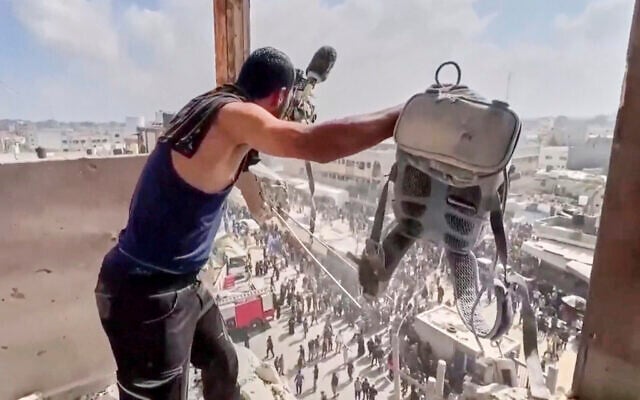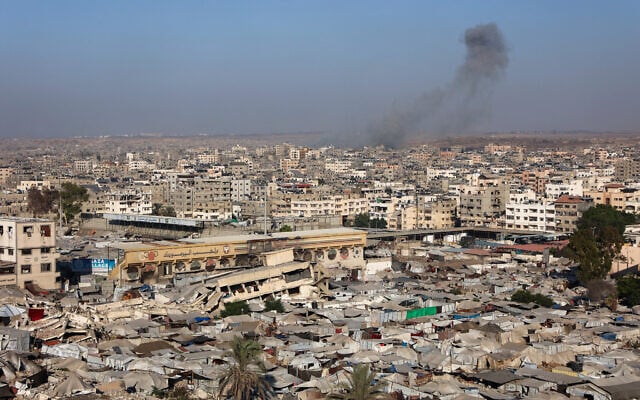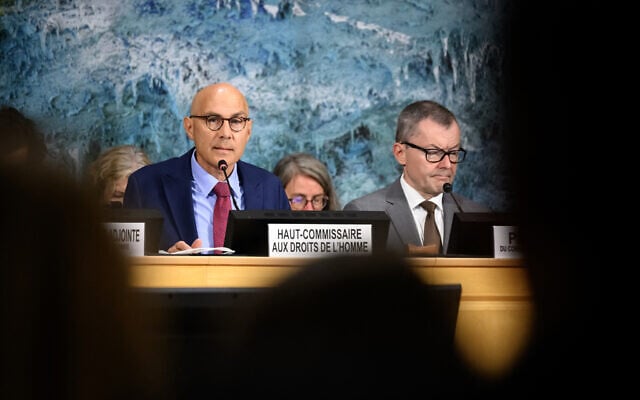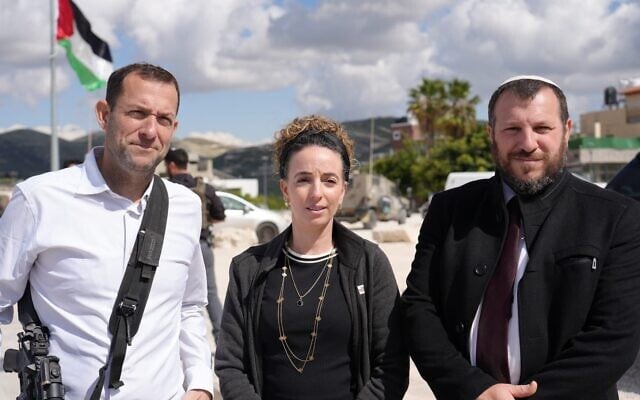


Swiss medics began a hunger protest outside parliament on Monday over the Gaza war, pressing Bern to take a more critical stance toward Israel, as the UN rights chief accused the country of engaging in “genocidal rhetoric” against Palestinians in the Strip and called for the “carnage” to end.
Switzerland has condemned some Israeli actions in the conflict, such as an attack on a hospital last month, but has held back from stronger steps sought by the protesters, such as imposing sanctions on Israel or recognizing a Palestinian state.
Medics have signed up to protest outside parliament in pairs wearing stethoscopes and medical tunics splashed with fake blood, taking turns in 24-hour fasts in a relay system throughout the September parliamentary session.
“A white tunic used to protect you. Today, if you want to save your life, you take it off, and that’s intolerable, and it’s intolerable we’re not reacting to that,” said Professor Pietro Majno-Hurst, a surgeon and member of the Swiss Healthcare Workers Against Genocide.
Israel has denied charges of genocide in Gaza and accused Hamas of embedding itself in civilian infrastructure, including hospitals.
The protest in Switzerland follows actions in Swiss universities and other anti-Israel protests over the weekend.
“We can say the government is currently silent, inactive, I would say, fairly cowardly, and is very lacking in courage. And I think today, it’s time for a change,” said Professor Karl Blanchet, director of the Geneva Center of Humanitarian Studies, who is part of the protest.
Foreign Affairs Ministry spokesperson Nicolas Bideau said Switzerland was “deeply concerned” by the humanitarian situation in Gaza and repeated calls for a ceasefire and for respect of international humanitarian law.
“The Federal Council believes that the recognition of a Palestinian state is part of the prospect of lasting peace based on the two-state solution,” he added.
Switzerland, which has close ties with Israel but a tradition of neutrality, has matched European Union sanctions on Russia over Ukraine, prompting accusations of double standards by some critics.
Bideau said Switzerland does not have legal autonomy on sanctions policy and can only match those of the UN or major trading partners, which have so far refrained from imposing sanctions over the Gaza war.
Two Swiss citizens were among the victims of the Hamas onslaught of October 7, 2023, when thousands of terrorists stormed southern Israel to kill some 1,200 people and take 251 hostages.
Israel’s retaliatory offensive in Gaza has killed more than 64,000 people, according to the Strip’s Hamas-run health ministry. The toll cannot be independently verified and does not differentiate between civilians and fighters.
Israel says it has killed over 22,000 combatants in battle as of August and another 1,600 terrorists inside Israel during the October 7 onslaught.
Meanwhile, the United Nations reported last month that parts of Gaza had reached famine levels, the highest starvation ranking in the UN’s classification. Israel has rejected the report, accused Hamas of hijacking aid shipments, and blamed the UN for delays in their delivery.
In a speech that was criticized by Israel, UN rights chief Voler Turk on Monday accused Israeli officials of using overt “genocidal rhetoric” about Gaza and called for decisive international action to “end the carnage.”
Turk stressed in a speech to the UN Human Rights Council that after nearly two years of war, “the region is crying out for peace.”
Gaza is already “a graveyard,” Turk said, accusing Israel of causing “indescribable suffering and wholesale destruction.”
“I am horrified by the open use of genocidal rhetoric and the disgraceful dehumanization of Palestinians by senior Israeli officials,” said Turk, without providing examples. His spokeswoman, Ravina Shamdasani, said separately to AFP that “this is not a case of one senior official mouthing off.”
A number of countries have sanctioned Finance Minister Bezalel Smotrich, who has called for Gaza to be “totally destroyed,” and National Security Minister Itamar Ben Gvir, who has called for Israel to “open the gates of hell on Gaza,” and “encourage” Gazans to emigrate.
Shamdasani also pointed to Environmental Protection Minister Idit Silman’s assertion in February that the only solution for the Strip is “to empty Gaza of Gazans.”
And Heritage Minister Amichay Eliyahu said during a radio interview in July that Israel was pushing to “wipe out” Gaza.
“Further militarization, occupation, annexation, and oppression will only feed more violence, retribution, and terror,” Turk said.
He insisted Israel had “a legal obligation to take the steps ordered by the International Court of Justice to prevent acts of genocide, punish incitement to genocide, and ensure enough aid reaches Palestinians in Gaza.”
The UN rights chief said the international community was “failing the people of Gaza.”
“Where are the decisive steps to prevent genocide?” he asked.
Israel, which disengaged from the UN Human Rights Council earlier this year, was not in the room during Turk’s presentation but reacted angrily.
Turk “is led by the anti-Israel activism that plagues his office,” Israel’s ambassador to the UN in Geneva, Daniel Meron, said on X, charging that Turk “continues to spread libelous rhetoric and undermines the security of the Jewish State.”





